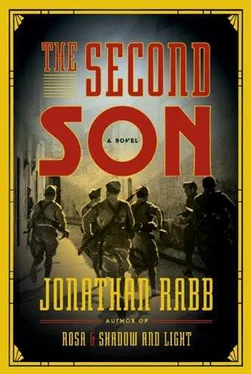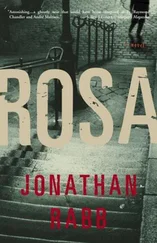Jonathan Rabb - The Second Son
Здесь есть возможность читать онлайн «Jonathan Rabb - The Second Son» весь текст электронной книги совершенно бесплатно (целиком полную версию без сокращений). В некоторых случаях можно слушать аудио, скачать через торрент в формате fb2 и присутствует краткое содержание. Жанр: Политический детектив, на английском языке. Описание произведения, (предисловие) а так же отзывы посетителей доступны на портале библиотеки ЛибКат.
- Название:The Second Son
- Автор:
- Жанр:
- Год:неизвестен
- ISBN:нет данных
- Рейтинг книги:4 / 5. Голосов: 1
-
Избранное:Добавить в избранное
- Отзывы:
-
Ваша оценка:
- 80
- 1
- 2
- 3
- 4
- 5
The Second Son: краткое содержание, описание и аннотация
Предлагаем к чтению аннотацию, описание, краткое содержание или предисловие (зависит от того, что написал сам автор книги «The Second Son»). Если вы не нашли необходимую информацию о книге — напишите в комментариях, мы постараемся отыскать её.
The Second Son — читать онлайн бесплатно полную книгу (весь текст) целиком
Ниже представлен текст книги, разбитый по страницам. Система сохранения места последней прочитанной страницы, позволяет с удобством читать онлайн бесплатно книгу «The Second Son», без необходимости каждый раз заново искать на чём Вы остановились. Поставьте закладку, и сможете в любой момент перейти на страницу, на которой закончили чтение.
Интервал:
Закладка:
But the truth was easier than that. Hoffner simply believed Georg was alive. He had no idea why he believed this, or why he knew Georg would still be alive when he found him, but time was no longer a concern. There was nothing he could point to in the last days to make this sudden certainty real, and yet here it was.
Hoffner had felt it only once before, this kind of ease, in the same heat, the same silence, the same taste of soured milk in the air. It sat deep in his past and yet lay quietly by his side, and Hoffner chose not to ask why.
He sat up and took a sip of the water, brown with silt. He stared out through the window and saw the hills under the moon.
Mila said, “He’s out there.”
He had thought her asleep. He nodded and lit a cigarette.
She said, “You thought he’d set that fire.”
Hoffner felt the heat of the room on his face. He let the smoke spear through his nose. He said nothing.
She said, “And what if he had?”
Hoffner took another pull as he stared out. “But he didn’t.”
“No-he didn’t. So you don’t have to save him from himself.”
He looked at her. “What does that mean?”
“The way you do with the other boy. Sascha. That’s the one you think you need to save. Georg didn’t set the fire, so it wasn’t your fault.”
He continued to stare at her. “That’s a stupid thing to say.”
“Is it?”
“You don’t understand.”
“You’re right, I don’t.” She reached out and took his cigarette. “So I’m left to bring out the trite and the obvious.” She took a pull. “I’m thirsty.”
Hoffner handed her the glass and watched as she drank.
He said, “I made him what he is.”
“No one makes anyone else into anything.”
“He was sixteen. A boy. I had a girl on the side.”
“A boy with a cheating father. What a remarkable story.”
“I threw it in his face.”
“I don’t believe that.”
“Then you’d be wrong.”
She held the glass up to him and he took it. He turned and set it on the ledge. And he stared out and knew that somewhere people were sleeping.
“It was at a railway station,” he said. “This girl. Sascha was there. He saw us together. There were words. I didn’t see him for eight years after that. It’s been another nine since.”
“Because he saw you with a girl?”
“You don’t see it. It sounds … different now. Small. It wasn’t. It’s what I was. It’s what he knew I was.”
“And what you were makes him what he is now? That must be so much easier to believe than anything else.” She reached across him and tapped her ash out the window. Her hair played against his chest, and she lay back.
He said, “So you want me to be blameless?”
“No. You’ll never have that. I loved my husband, even when he had a woman in Moscow. He stopped it, and we went on.”
It took Hoffner a moment to answer. “It’s different.”
“Why? Because you think a woman needs to forgive? Because your wife forgave you every time she knew you had another one?”
“He was a boy.”
“My husband wrote me at the end. He said he deserved to be dying. Freezing to death, and he needed to tell me it was because of what he had done to me. How much he regretted it. Can you think of anything more stupid than that?”
Hoffner hadn’t the strength for this. “No. I suppose not.”
She sat straight up and forced him to look at her. “Don’t do that. Don’t ask to be forgiven because you can’t forgive yourself. You’re here for Georg. You risk everything for Georg. But it doesn’t make you a better man that you do. You do it, and it’s enough.”
Hoffner stared at her. “And it’s enough for you?”
She looked at him. Hoffner thought to hold her but she lay down. He lay beside her and brought her back into his chest.
“Yes,” she said. “It is.”
And he slept.
“He let him die.”
The man behind the bar set the glasses down in front of Hoffner and began to pour. “His own son,” he said, a tinge of respect to mask the shock. “That’s who sits up in the Alcazar now.”
It was eleven in the morning, and the hundred kilometers to Toledo had been dry. They required a drink, something with a bit more bite than wine. This was brandy from the south, Jerez, the last bottles Toledo would be seeing for quite some time. It felt good to have this kind of burning at the back of the throat. Hoffner told the man to refill his glass. He then joined Mila outside. She was on a bench, staring up through the tiled roofs along the narrow street. She took her glass and drank, and Hoffner peered up.
There was no escaping the gaze of the massive fortress on the hill, stone and towers and windows in perfect line. The Alcazar had watched over Toledo for nearly five hundred years. Now it was Toledo that stared up and wondered how soon the stones would fall.
The talk in the bar had been of the fascist rebels inside. There were a thousand of them: cadets, Guardia, their wives and children, and all those fat ones who had scampered up to the gate, pounded on the doors, and begged to be let in the moment it had all turned sour for them. The Republican forces had taken the city, and the fascists were now holed up with no hope of surviving. The Alcazar had become a little city unto itself, with thick walls and iron gates to keep the fascists safe inside, while outside the Republican militias plotted and tossed grenades and waited for the end.
And how had this all come to pass? Because the man keeping the fascists calm inside was a colonel by the name of Jose Moscardo. Moscardo hadn’t been part of the July 18 conspiracy; he hadn’t known of Franco and Mola and Queipo de Llano. But he did know which Spain was his. And so, seizing the moment, he dispatched the entire contents of the Toledo arms factory up the hill and into the fortress before the Republican militias could stop him. It was an unexpected coup.
Save for one small point. While Moscardo might have shown remarkable savvy in ferreting away men and soldiers and guns and children, he was less astute at protecting his own. Somehow, in all the mayhem, he forgot his sixteen-year-old son Luis outside the fortress walls. Within hours, the boy was taken hostage by the militias, who promised to shoot him if his father refused to surrender. It was a brief conversation on the telephone, at which point Moscardo asked to speak to his son.
“They have me, Father,” said Luis. “What shall I do?”
Moscardo thought a moment. “If this is true, commend your soul to God, shout ‘?Viva Espana!’ and die like a hero.”
“That,” said the boy, “I can do.”
It was an act of uncommon bravery. Word of it had spread to the south and the far north, where Moscardo and the Alcazar were already things of legend for the rebel fascist soldiers: the new Abraham, they called him, although this time God had failed to reach out to save his Isaac. This time, faith had truly been tested.
The fascist soldiers chanted their names, and the great fortress became the bastion of all that was good and true in Spain.
Hoffner said, “The barman said we’d do best with a group headquartered near the cathedral.” He tossed back the last of his drink. “Republican army. Slightly more organized than the Communists.”
“That’s no great surprise,” said Mila.
“The man said ‘slightly.’ I don’t think this is going to be files in triplicate.”
“Is he sending someone to take us?”
“Why?”
“Because it’s Toledo. He could draw us a map and we’d never find it.” She finished her glass and stood. “And I’m all out of bread crumbs.”
Mila was right. It would have been impossible to maneuver through the city without a guide. The boy was no more than ten years old, his canvas rope-soled shoes worn through with a few toes sticking out, but he moved them along at a nice clip. The streets were narrow and dark and slipped from one to the next, turning, then rising up a hill, before seeming to double back on themselves. Hoffner expected the bar to reappear each time they turned a corner-a sheepish look from the boy, a recalculation-but the streets poured on in endless variation: smooth stone against jagged rock, box windows of iron or wood. And always the balconies-barely enough room for a man to stand, rails only tall enough to a keep a child from falling.
Читать дальшеИнтервал:
Закладка:
Похожие книги на «The Second Son»
Представляем Вашему вниманию похожие книги на «The Second Son» списком для выбора. Мы отобрали схожую по названию и смыслу литературу в надежде предоставить читателям больше вариантов отыскать новые, интересные, ещё непрочитанные произведения.
Обсуждение, отзывы о книге «The Second Son» и просто собственные мнения читателей. Оставьте ваши комментарии, напишите, что Вы думаете о произведении, его смысле или главных героях. Укажите что конкретно понравилось, а что нет, и почему Вы так считаете.












